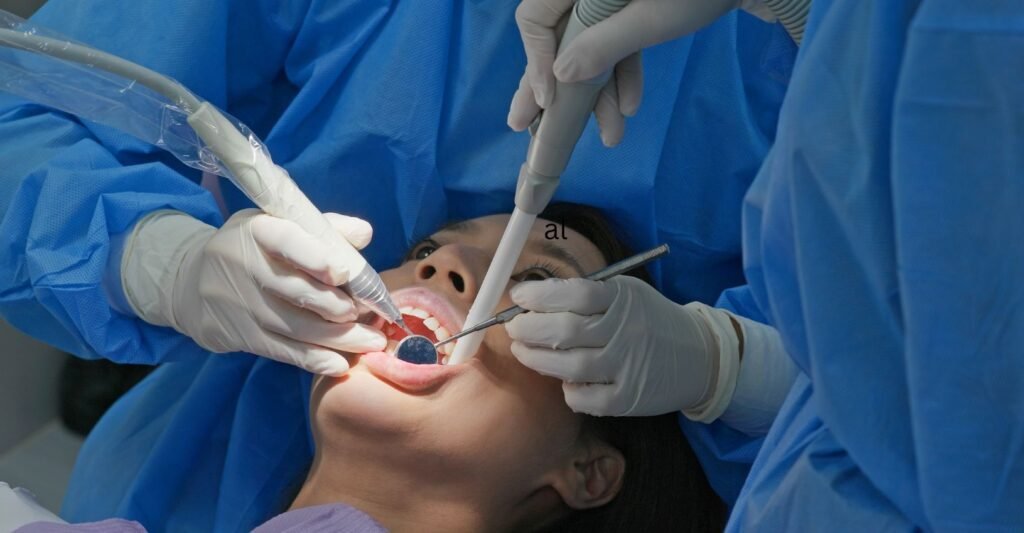
In a 2014 study carried out by the American Association of Prosthodontists, it was estimated that 178 million Americans had one or more missing teeth. Yet, while it’s no secret that dental implants provide an outstanding and long-lasting solution to tooth loss, reports also suggest that just 1% undergo an implant-based restoration.
This could be down to the initial costs involved but it could also be down to the fear factor of undergoing a dental implant procedure. To prove a point, the search term “Do dental implants hurt” gets around 500 searches per month, so people are clearly concerned about the process. But are they right to be worried? Is getting tooth implants painful?
In this post, we’ll answer that question in detail, unveiling the truth and debunking some of the myths along the way.
So do dental implants hurt?
Well, yes and no!
To fully answer this common concern, we need to break down the procedure into two stages:
- During surgery, and
- After surgery
Firstly, implant surgery

If you understand anything about dental implants, you’ll know that implant-based restorations differ from other forms of tooth replacement because they require a short surgical procedure, during which a titanium post is inserted directly into the jawbone.
The metal post, (known as the implant) provides stability and support for a restoration tooth or teeth.
Many people are understandably anxious about the surgical part of this procedure but is there any need to be?
In a word, no!
The most time-consuming aspects of the surgical phase – the placement, are often pre-planned on a computer using an exact simulated match of your mouth and jaw. This means that the majority of surgical procedures are over before you know it, typically taking less than an hour to complete.
Moreover, when computer-guided methods are introduced, surgical time can be reduced to under 20 minutes because there is no need to make an incision in the gum.
Some myths going around intimate that dental implant surgery can be extremely uncomfortable as dentists grapple with drilling down into the jawbone while inserting the implant. In reality, all patients should feel (if anything) is slight pressure emanating from the implant site.
Besides, dental implant surgery is classed as a minimally invasive procedure and is normally carried out in an outpatient setting under local anaesthetic. So, this part of the process is usually no worse than having a tooth filled.
So, do dental implants hurt during the surgical phase of treatment? No!
But what about post-surgery, are dental implants painful then? Let’s take a closer look.
Dental implant pain after surgery

During the post-surgical phase, patients can expect some degree of discomfort. This is only natural because there will be a certain amount of trauma to the gum and implant site. But again, how much trauma, depends upon the degree of surgery itself.
A single implant placement with no complications may produce little to no swelling or bruising and the patient may be back to normal within a few days.
Whereas a patient who has undergone multiple implants may experience significant swelling and bruising and by default, recovery may take longer.
Of course, you may know people who tell you that implant surgery causes significant discomfort and as a result, a foreseeable future of liquidized food is the only thing to look forward to. The reality is that this is simply not true.
In truth, patients can and should expect some degree of discomfort, but it’s nothing that can’t be brought under control using common over-the-counter medications like Tylenol or Ibuprofen.
Moreover, depending upon the type of surgery and the number of implants, any pain should disappear within 3-10 days. So, by day ten, most patients are feeling back to normal.
But what about eating?
You should indeed expect to adopt a softer food diet for several weeks particularly until the implant has stabilised in the jaw. But that doesn’t mean living on a diet of pureed vegetables.
On the contrary, foods like mashed potato, fish, soft pasta and soups can all be eaten safely and comfortably after the first 24-48 hours.
Furthermore, patients can start to introduce other foods as and when they see fit. In fact, dentists will advise you to adopt a varied and nutritious diet to aid the healing process. Just avoid any crunchy or hard foods for a while.
So do dental implants hurt after surgery?
Maybe, but only for a limited time.
Essentially, it isn’t normal for patients to experience significant discomfort or prolonged pain. If they do, it could signify a greater problem that the dentist needs to address.
The final take
Dental implants represent the pinnacle of missing tooth replacement and anyone who has undergone tooth implants will tell you that the renewed quality of life they bring, far outweighs any temporary discomfort one might feel during the procedure.
So, if you are missing teeth and they are impacting your everyday life, don’t listen to the hype. Instead, talk to an experienced implant dentist who will tell you everything you need to know to make a fully informed decision.